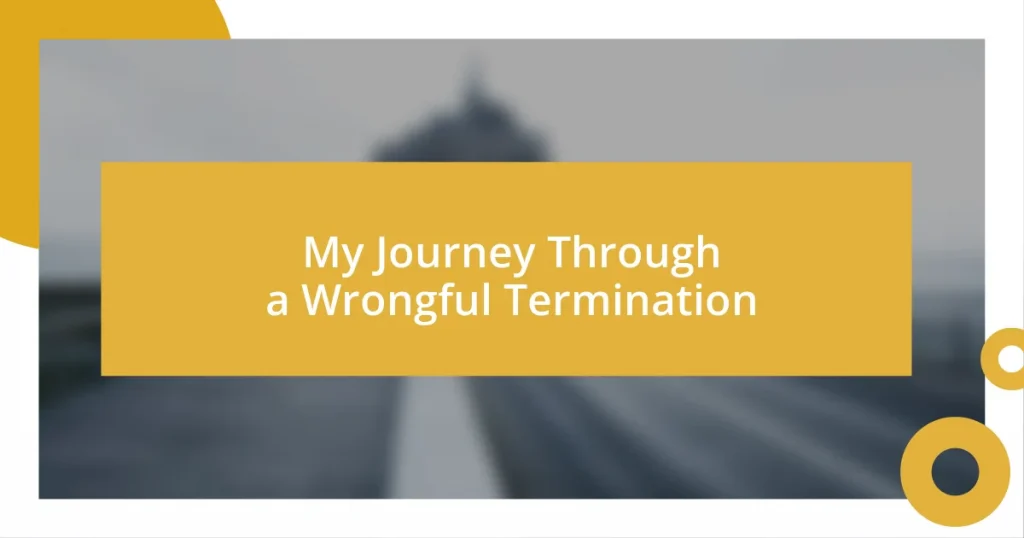Key takeaways:
- Understanding wrongful termination involves recognizing illegal job dismissals linked to discrimination, retaliation, or breach of contract and educating oneself about legal rights and protections.
- Gathering evidence and sharing experiences with others are crucial steps in reclaiming one’s narrative and preparing for potential legal battles after wrongful termination.
- Moving forward after termination requires setting achievable goals, networking, and reflecting on one’s identity to find new paths and opportunities.
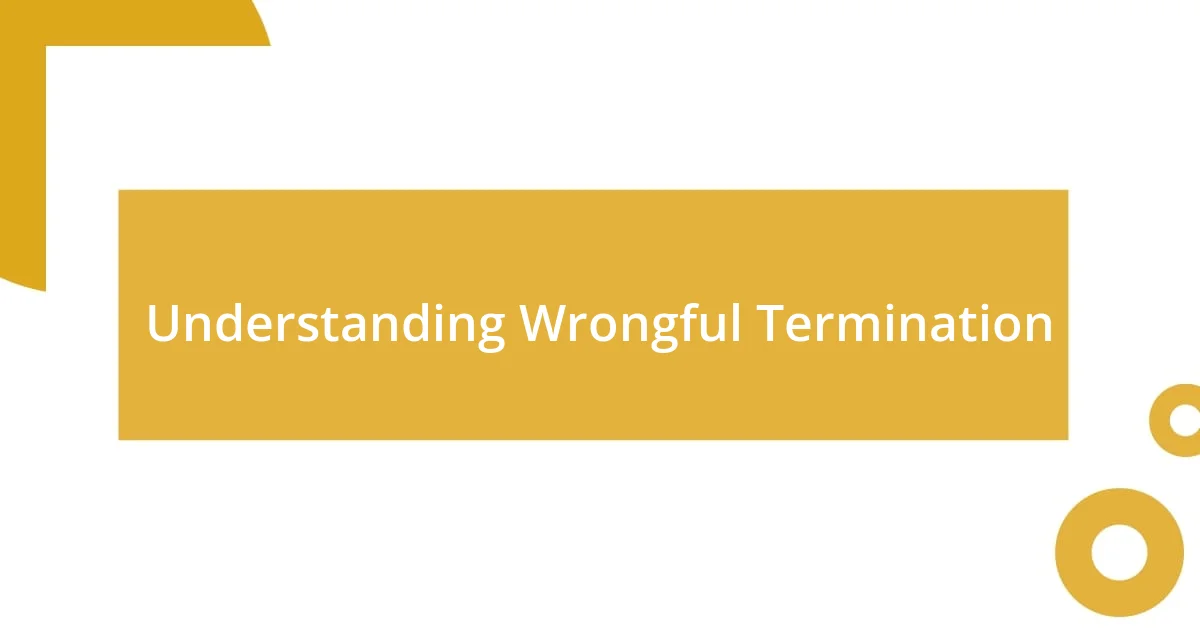
Understanding Wrongful Termination
Understanding wrongful termination can feel like navigating a confusing maze. It often involves losing your job for reasons that are illegal or against workplace policy. For instance, I remember a colleague who was let go after reporting unsafe working conditions, highlighting how retaliation can be at the heart of wrongful termination.
At its core, wrongful termination means that you were fired not based on your performance but rather due to discrimination, retaliation, or breach of contract. When I faced my own abrupt dismissal, I felt a whirlwind of emotions—betrayal, confusion, and anger. It was hard to grapple with the idea that my employer had not only broken our agreement but also disregarded my well-being.
Have you ever questioned the fairness of a job loss? It’s a challenging realization to comprehend that your rights might be overshadowed by an employer’s unethical choices. Understanding these nuances is crucial, as it empowers you to stand up for yourself and seek justice if you find yourself in a similar situation.
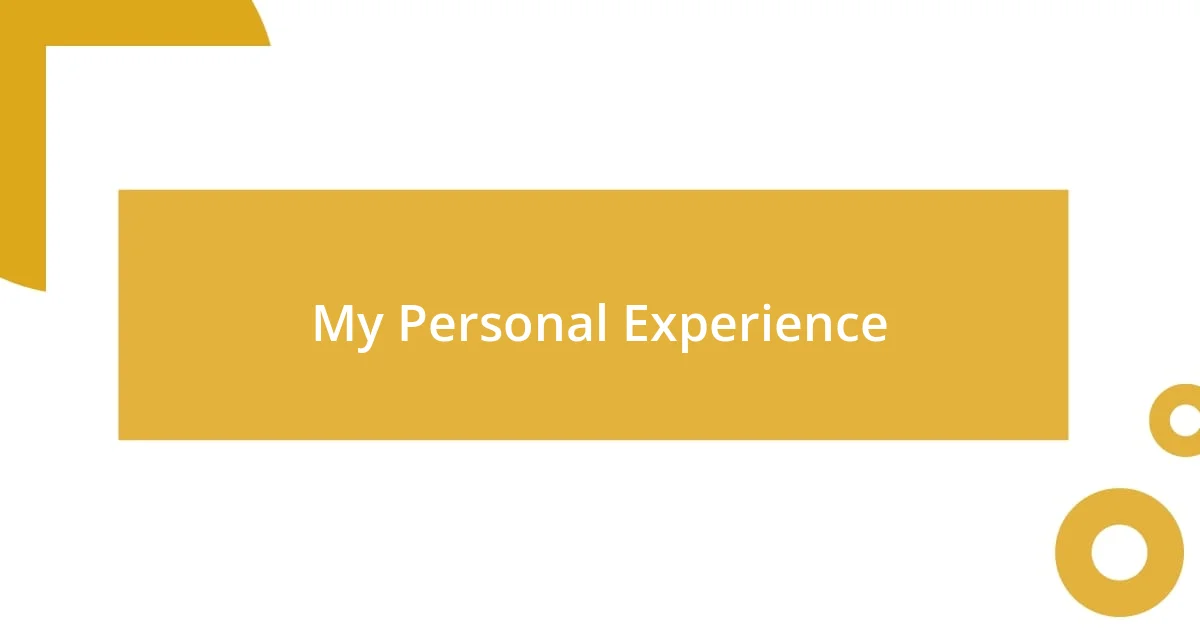
My Personal Experience
When I think back to my termination, it feels surreal. I remember sitting in that conference room, the weight of the moment pressing down on me like a ton of bricks. My mind raced as the words “we have to let you go” floated in the air. I felt blindsided, especially knowing how hard I had worked and the contributions I had made. The shock quickly turned into anger when I learned the real reason behind my dismissal was sharing constructive feedback during a team meeting.
Reflecting on that experience, several things stood out to me:
– Isolation: I suddenly felt all alone, unsure who to turn to for support.
– Denial: I couldn’t believe this was happening to me.
– Resilience: I knew I had to fight back, both for myself and for those who might face similar circumstances.
– Empowerment: As I researched wrongful termination, I felt compelled to educate myself about my rights.
– Hope: Connecting with others who had been through similar experiences became a source of strength.
Navigating this situation wasn’t just about reclaiming my job; it became a journey of self-discovery and understanding my worth in a world that sometimes overlooks fairness.
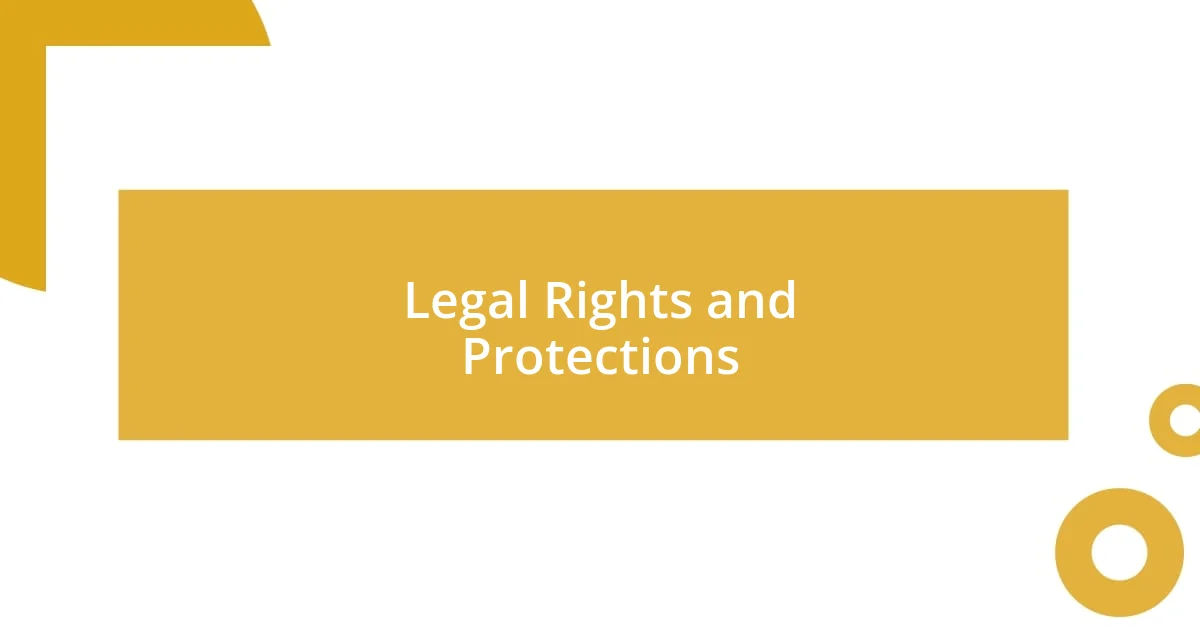
Legal Rights and Protections
Understanding your legal rights and protections in the context of wrongful termination is essential. For many, the idea of fighting back can feel overwhelming. I remember when I first delved into the legal aspects after my own experience; it was like flipping a switch. Realizing that laws exist to protect employees from unjust dismissals made me feel a flicker of hope. Did you know there are various federal and state laws that shield you from wrongful termination?
In essence, employees are protected against being fired for discriminatory reasons, such as age, gender, race, and disability. I learned firsthand that there are mechanisms, like filing a complaint with the Equal Employment Opportunity Commission (EEOC) or a similar state agency. This opened my eyes to the fact that while my termination felt very personal, it was, at its core, a violation of my rights. Exploring these protections not only educated me but also empowered me to take action.
It’s worth noting that certain equipment can aid your journey in advocating for your rights. For instance, gathering relevant documents and evidence can significantly bolster your case. When I collected emails and performance reviews, it was empowering to see tangible proof of my contributions. It reinforced my belief that standing up for myself was not just my right but also my responsibility.
| Legal Rights | Protections |
|---|---|
| Discrimination | Protected against termination based on race, gender, age, or disability. |
| Retaliation | Shielded from firing for reporting harassment or unsafe conditions. |
| Breach of Contract | Entitled to challenge wrongful termination if it violates contract terms. |
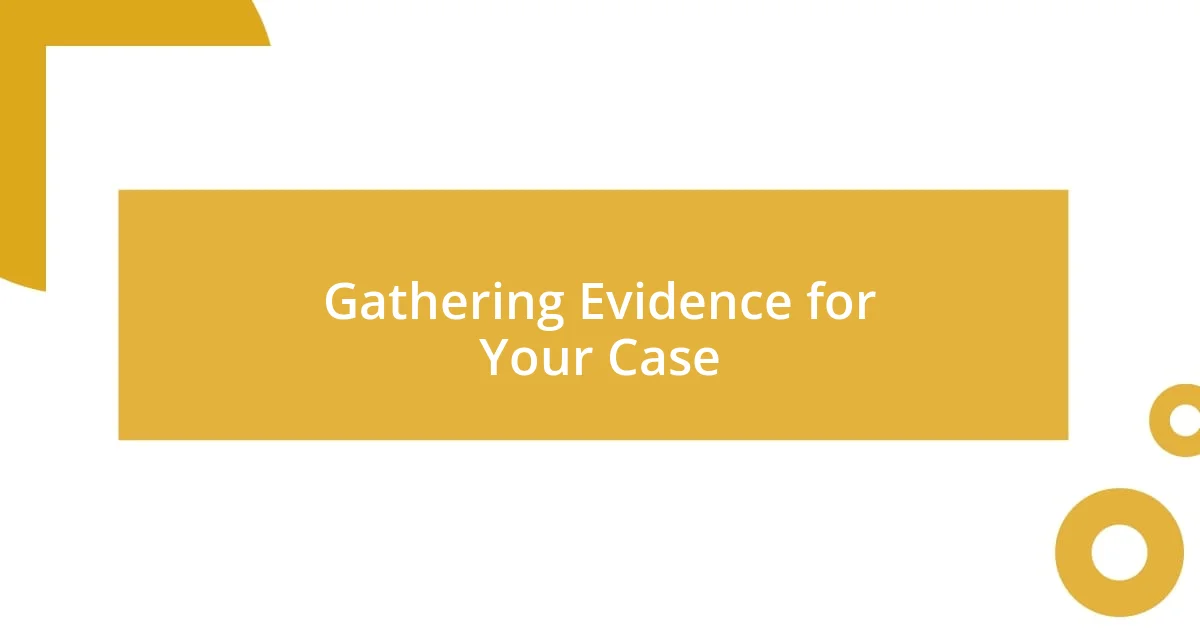
Gathering Evidence for Your Case
Gathering evidence for your case after a wrongful termination is a crucial step. I recall spending hours sifting through my emails, trying to piece together a timeline of events. Each message I found felt like a clue, reinforcing my narrative and helping me realize that I wasn’t just another number in the system.
It’s not just about collecting documents; it’s about telling your story. When I reached out to colleagues about their experiences or for corroboration, I found that some were willing to share their insights, which added depth to my evidence. Did I have every single incident documented? No. But the accounts of those who witnessed the unfairness added a compelling layer to my case.
Ultimately, gathering evidence is a way to reclaim your narrative. I often thought, “What if the tables were turned? Would they understand how their actions impacted my life?” Channeling that energy into compiling my evidence not only prepared me for potential legal battles but also gave me a renewed sense of purpose. The act of gathering felt like a declaration that I was serious about fighting back.
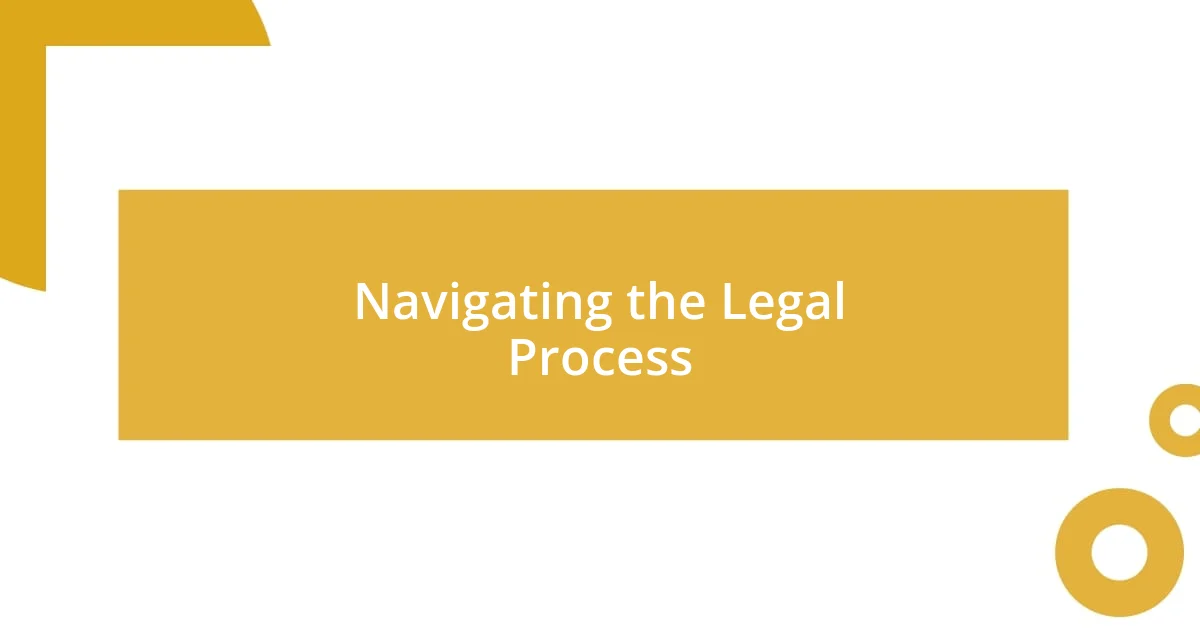
Navigating the Legal Process
Navigating the legal process after a wrongful termination can feel daunting, and I distinctly remember my initial anxiety about how to get started. I quickly realized that consulting an attorney experienced in employment law was invaluable. Their expertise not only clarified the steps I needed to take but also provided a sense of reassurance; I wasn’t in this alone. Have you ever felt lost in a situation where every decision seemed critical? For me, finding that legal ally was like having a compass that pointed me in the right direction.
Once I began the legal process, I found that it was essential to stay organized and attentive to deadlines. I vividly recall a moment when I overlooked a filing date and felt the weight of panic set in. However, I learned that creating a timeline of activities, including important dates and submitted documents, kept me on track and reduced my stress. Did that mean I didn’t make mistakes? Of course not! But those small systems of organization empowered me to feel in control.
As I navigated the intricacies of claims and paperwork, I had to remain patient and persistent. There were days when I wanted to throw in the towel; the waiting was excruciating. I discovered that engaging in support groups or forums filled with others who had similar experiences brought a sense of community. Honestly, talking it out with those who understood my struggles reminded me that this journey was about more than just me—it was about holding accountable those who mistreat others. How can we bridge that gap between our personal challenges and the larger fight for justice? The answer, I found, lies in solidarity and shared determination.
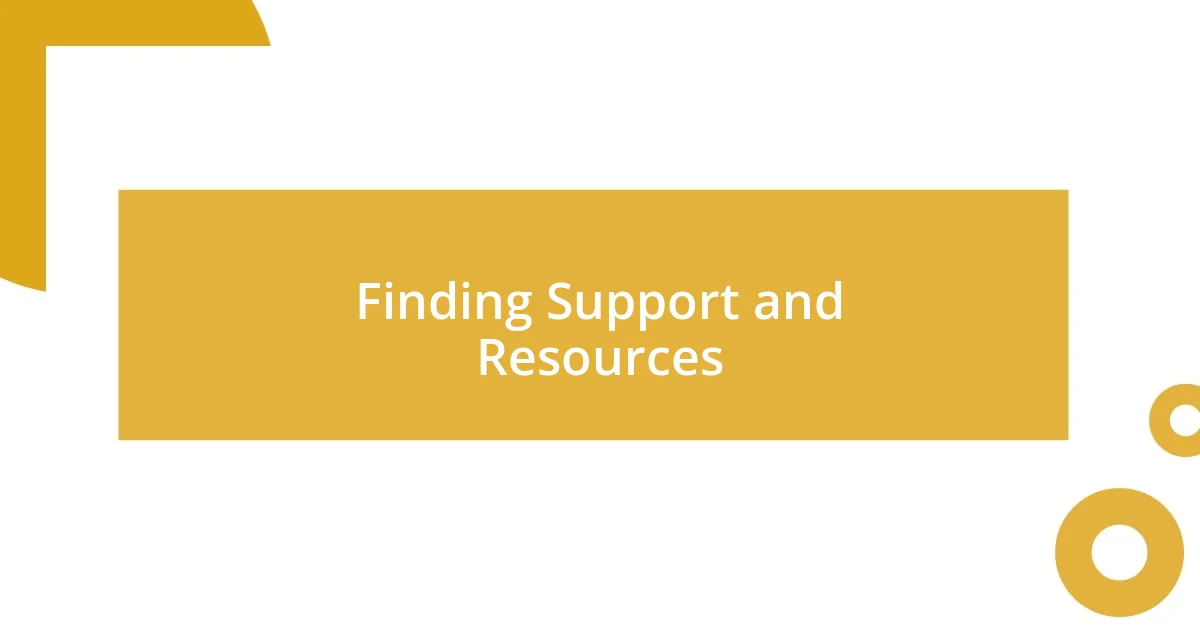
Finding Support and Resources
Finding support and resources during such a tumultuous time was essential for me. I remember stumbling across online forums for individuals who had faced wrongful termination like I did. Connecting with people who shared their stories gave me a sense of validation; I wasn’t the only one grappling with these overwhelming emotions. Have you ever sought out a community to simply feel understood? I found it incredibly empowering to share my journey and hear the experiences of others.
In addition to online communities, I leaned heavily on friends and family for emotional support. I often felt buried under a weight of solitude, but simply talking to my close circle lightened that burden. Their encouragement at times when self-doubt crept in made a tangible difference. I can’t emphasize enough how vital it was to express my feelings and fears openly—there was strength in vulnerability. Plus, friends often share insights you might overlook; have you had a moment when a loved one offered unexpected advice? For me, it was pivotal.
Seeking professional guidance also played a crucial role as I navigated this challenging landscape. Engaging with a therapist to work through my emotional responses helped me maintain my mental health amidst the chaos. It was eye-opening to explore coping strategies tailored to my situation. I often thought, “What tools can I find to empower myself during this?” Through therapy, I developed a toolkit of strategies that not only supported me but also helped me reclaim my sense of self-worth. Ultimately, building a network of support changed the trajectory of my journey, reminding me that healing often comes from collaboration and shared experiences.
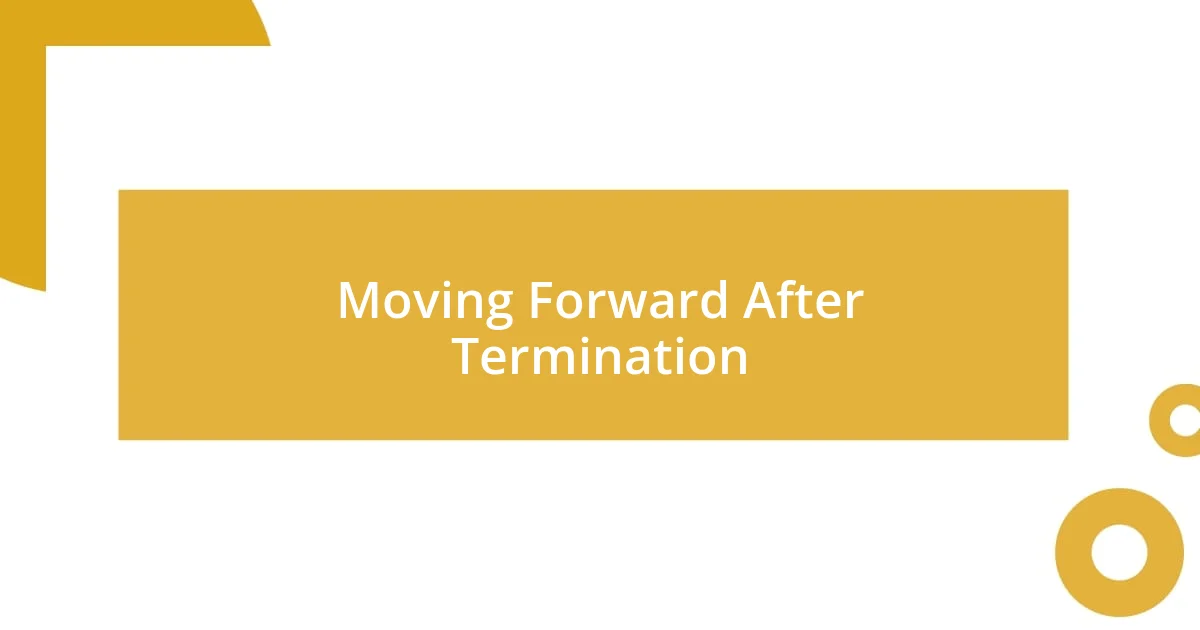
Moving Forward After Termination
Moving forward after termination is undeniably a transformative phase that demands both courage and resilience. I remember waking up one morning feeling a mixture of fear and excitement—the world felt both daunting and full of possibilities. Have you ever stood at a crossroads, unsure of which path to take? For me, that feeling became a catalyst for reflection. I started exploring new career ideas that had always intrigued me. It was liberating to think that every end could inspire a new beginning.
As I ventured into this uncharted territory, setting small, achievable goals became crucial. I recall creating a vision board filled with aspirations, ranging from enhancing my skills to pursuing entirely different fields. Each image and word acted like a lighthouse guiding me through uncertainty. I regularly asked myself, “What steps can I take today to build my future?” Focusing on these tangible targets created a sense of purpose that helped drown out the noise of self-doubt and regret.
Networking gradually became one of my most empowering tools. I can still feel the exhilaration of attending my first industry event, full of strangers who could potentially become allies. Striking up conversations felt like an act of bravery, and I often thought, “What if these connections lead me somewhere amazing?” In the end, some of those initial awkward exchanges blossomed into meaningful professional relationships that opened new doors for me. Moving forward after termination was not just about finding a job; it was about rediscovering my identity and purpose in the process.









